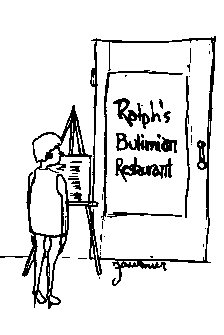E*CLASM
Invective your newsmonger won't publish.
$12 postpaid (special price)
Click here to order
Revenge of the Shysters
Pakistani lawyers went on strike last week for a day. They were protesting the "referendum" on the presidency of their military dictator Pervez Musharraf. They closed the courts, but they don't seem to have done any lasting damage to the judicial system or any other institution.
I think U. S. lawyers should go on strike, and they ought to stay out for at least a week. America deserves to do without lawyers for awhile. Commerce would almost certainly come to a standstill by the end of the third day, and that would be a rare instance of divine justice exacted on the opportunistic classes.
I practiced law for eleven years, and my biggest challenge as an attorney was getting paid. All the lawyer-bashing turns out to be simply an excuse to chisel lawyers out of their fees. The people lawyers serve--psychopaths, the negligent, cheats, businessmen, and other predators--are rotten, for the most part, and their greatest pleasure is to gain an advantage over their own lawyer. As part of my general practice, I handled some collections for fee-chargers in other fields, and there are deadbeats everywhere, but lawyers bring out the worst in people. Our clients revile us even as they tell us their secrets. Maybe they hate us because we know their secrets.
That was one of the most frustrating things about legal practice. You find out how genuinely venal the people you know and love really are. In day-to-day life, people don't routinely ask each other what they can and can't get away with. In a law office, such advice is the proprietor's stock-in-trade. I was surprised to find people I considered moral and upright infected with ideas and plans that exposed them as villains. A regular diet of that sort of thing can affect your opinion of your neighbors, and even of your friends and relatives.
Since Reagan, lawyers have been determining public policy, not as an interest group, but more in the way that competing teams of individual players determine the course of a baseball season. Since Reagan, the executive and legislative branches have retired from the field of controversial public issues, applying their political talents to self-enrichment and the enrichment of patrons, leaving it to litigants to fight things out in court.
Tobacco is in retreat because of lawyers doing their jobs. Pedophile priests are exposed because of lawyers doing their jobs. The death penalty is under attack by lawyers doing their jobs. Enron was brought down by lawyers doing their jobs. Lawyers doing their jobs will eventually rein in John Ashcroft, our loose-cannon of an attorney general, and maybe even our handsome Secretary of Mayhem, Don Rumsfeld.
If lawyers went on strike, the last residue of our government of laws could finally evaporate, and wouldn't that be an ironic end to our republic? I went on strike once, to protest Bush I's war against Panama. My strike didn't change the world much. I happened to be carrying on a sole practice at the time, so when my clients called and got my recorded message--"I'm on strike . . ."--they felt a bit put off. If you remember, that military engagement occurred around Christmas and was over fairly quickly, so relatively few people were affected by my strike. Plus a general strike involving only one person tends to be relatively ineffective.
But suppose Don Imus, for example, radio voice and notorious lawyer-basher, got sued and couldn't find a lawyer? What if the day came when nobody in America could find a lawyer? The event in Pakistan gives me hope that such a thing could happen.

Plagiarists on Review
Expect the words "plagiarism" and "plagiarist" to disappear from the language soon. They're freighted with moral judgment, and the last thing the owners of the printed word want to do is subject their staff scribblers to any sort of moral or ethical standard.
Plagiarism sounds like an offense of some kind, a branch of cheating. And cheating, being an intentional wrong, reflects unfavorably on the cheat. Wouldn't want to do that to prominent, popular dispensers of conventional wisdom such as Stephen Ambrose and Dorothy Kearns Goodwin.
Contrast the harsh term "plagiarism" with this fluffy prose, from an AP story about Stephen Ambrose's recent announcement that he has cancer:
"He has come under scrutiny recently after at least six of his books have been questioned for failing to properly credit source material. Ambrose has apologized for lifting passages from other authors."
That's so much kinder and gentler. "Questioned for failing to properly credit source material" and for "lifting passages." In six books. Oops.
The truth is that those who publish words claim a right on behalf of their authors to do just what Ambrose did. All this compulsive checking and rechecking is expensive, and so what if somebody's stuff gets used without attribution? Can't the ten or so publishers who own most of the words hash these things out among themselves without a lot of sanctimony on the part of a small, loud, nitpicking minority?
The big publishing houses are not alone. The protection of intellectual property is now widely considered anachronistic. Modern technology renders copyrights and patents irrelevant. Never mind that without them and the prospect of profit, creative people will stop bringing their creations to the market.
That's happened already in music, literature, and movies, where originality has been eliminated, and "artists" like Puffy Combs and Stephen King and Andrew Lloyd Weber and Steven Spielberg--masters of knock-off--reign supreme. In a few years, creative activity will cease altogether.
2810
Check this out: Current Invective
Last Issue: April 28, 2002